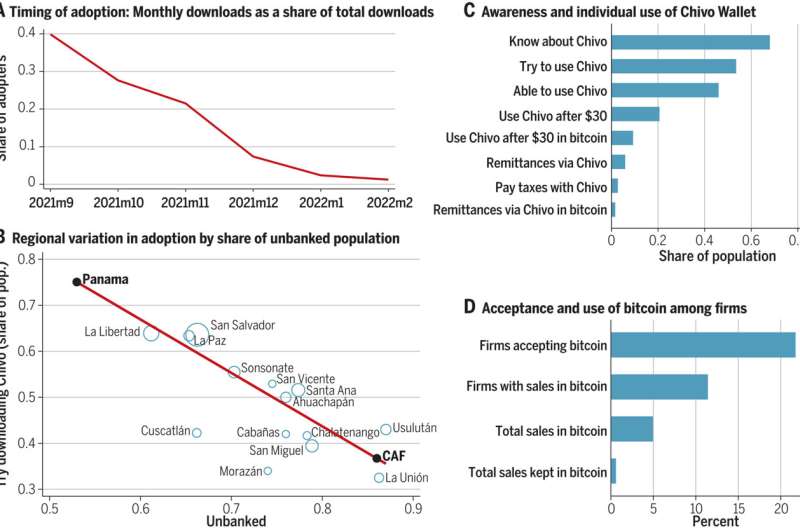December 22, 2023 report
This article has been reviewed according to Science X's editorial process and policies. Editors have highlighted the following attributes while ensuring the content's credibility:
fact-checked
peer-reviewed publication
trusted source
proofread
Case study of cryptocurrency suggests many do not trust its transparency and privacy

A trio of economists and financial analysts, two from Yale University and the other the University of Chicago, has conducted a case study of a nationwide cryptocurrency experiment to better understand why such a monetary system might or might not work as intended. In their paper published in the journal Science, Fernando Alvarez, David Argente and Diana Van Patten, describe their analyses of an attempt by the government in El Salvador to make cryptocurrency a popular choice for the people of that country and what they found by doing so.
Over the past half century, it has become apparent to some that established banks and the banking system in general do not always deal favorably with people on the lower spectrum of the economic scale. Because of that, various alternatives have arisen.
One such alternative is cryptocurrency. It has been championed as a currency for the poor because of its anonymity—people who use it do not have to give up their personal information or credit history. Unfortunately, that same positive attribute has led to accusations by some that cryptocurrency systems (such as Bitcoin) allow criminals and terrorist organizations to move money around without being traced.
In this new study, the researchers wondered how average people view such systems and if they are willing to embrace them. To that end, they conducted a case study of the history of Bitcoin in El Salvador.
In 2021 the government of El Salvador formally recognized Bitcoin as legal tender throughout that country, hoping to give it credibility—as part of that effort they began allowing citizens to pay their taxes using the system. The government also ordered all businesses across the country to begin accepting Bitcoin as a payment method—including debt collectors.
Then, to make it easier for everyone in the country to use the new currency system, they introduced Chivo Wallet, a phone app that could be used to exchange and trade Bitcoin—and U.S. dollars. One thing the government did not do was stop the use of the U.S. dollar as a legal exchange medium—the official currency of the country, the colón, is seldom used and has largely passed out of circulation.
To learn more about the acceptance or lack of adoption of the new currency system, the researchers conducted face-to-face interviews with people living in 1,800 households across the country. They were also given access to transaction numbers for Chivo Wallet.
The research team found that use of Bitcoin in El Salvador has remained low, and its use has been declining since the government began its push. The reason given for refusing to embrace the new currency system, the team found, was mainly transparency and privacy issues—regular people do not trust the people running the cryptocurrency system. Because of that, most still preferred cash—U.S. cash. They also found that most of the people who use Bitcoin in El Salvador are wealthy people who also continue to use the regular banking system.
More information: Fernando Alvarez et al, Are cryptocurrencies currencies? Bitcoin as legal tender in El Salvador, Science (2023). DOI: 10.1126/science.add2844
© 2023 Science X Network





















